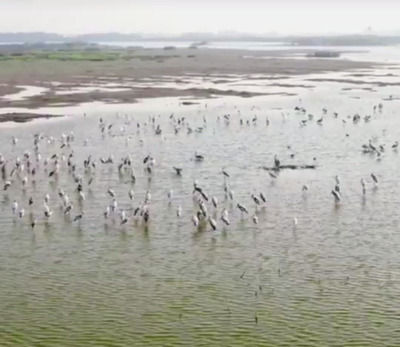
Hyderabad: Bharat Jodo Abhiyan convener Yogendra Yadav accused the Bharatiya Janata Party (BJP) of undermining India’s electoral democracy by attempting to impose ‘One Nation, One Election,’ ‘Delimitation,’ and ‘Special Intensive Revision’ on the people.
Speaking on the sidelines of ‘Challenges to the Architecture of Electoral Democracy’ at the 16th Balagopal Memorial Meet held at Sundarayya Vignana Kendram in Baghlingampally on Sunday, October 12, Yadav said that the recent Lok Sabha elections have shaken the BJP, and people have rejected ‘Modi Ki Guarantee.’
One Nation One Election
“BJP knew that they could not change the Constitution from the front door, so they have decided to change the architecture of institutions. The One Nation One Election (ONOE) to tackle the problem of time and calendar, delimitation to address region and space, and special intensive revision (SIR) to manage sections of the society,” Yadav said.
He said that the “competitive authoritarian state” was transitioning towards an “electoral autocracy.”
He also questioned why the Union government did not hold the Maharashtra and Haryana Assembly elections simultaneously if it truly believed in ‘One Nation, One Election’ concept. “BJP would have failed to secure a majority in the Odisha elections had the state and Lok Sabha elections been conducted together,” he remarked.
Delimitation a disadvantage to non-Hindi speaking states
He said that if delimitation of Lok Sabha segments is done as per data provided by the 2026 population census, states like Kerala, Tamil Nadu, Andhra Pradesh, Telangana, West Bengal, Punjab and Odisha will lose their number of seats in the Lok Sabha, while the seats in the Hindi-speaking states will increase from 226 to 259.
10-20 percent voters to opt out of electoral process through SIR
On SIR, Yadav said that the election exercise was not a revision of electoral rolls, but rewriting the basic rules of who is voting. “The onus of being on the voters’ list has shifted from the Election Commission of India to the voters,” he noted.
Yadav further pointed out that, unlike in the United States, India is a state-driven process. “As a result, India has achieved over 98 percent voter registration and reflects a strong public participation in the election,” he said, adding, “The US lags behind in this regard.”
History repeats itself
Giving the example of the disenfranchisement faced by the African-Americans after the Civil War in the US, where they were asked to show property documents to participate in the electoral democracy, Yadav said a repeat of the same will happen if people are asked to show a document in India.
“This could lead to 10-20 percent of voters dropping out as they get disenfranchised, and most of them will be women, migrants, the labour class and the poor,” he pointed out.
Election Commission is lying
“The ECI saying there will be a nationwide SIR is a lie. When enumerators went to households, the enumeration forms were not filled out. The voters were not asked to show any document unless there was something suspicious,” he said.
Terming SIR as a “large-scale disenfranchisement exercise,” he said all three initiatives combined were “the biggest challenges to the architecture of whatever remains of democracy,” against which the people should make a resolve, which will be a real tribute to K Balagopal, the human rights champion who inspired generations.
Whose Bastar?
Dr Nandini Sundar, professor at the School of Economics, Delhi University, delivered a talk on ‘Whose Bastar? The struggle for Adivasi Futures’ and spoke extensively on violations of Adivasi rights by the State.
“Governments are using the police forces to protect the operations of the mining companies, while suppressing the Adivasi voices,” she said.
She said that over 585 mining companies, including public and private companies, are currently operating in Bastar. “A large police force is present in these areas,” she said.
She pointed out how despite the 2011 Supreme Court’s order on the discontinuation of Special Police Officers (SPO), the dismantling of Salwa Judum, weeks later, the Chhattisgarh Auxiliary Armed Force Act was passed, and the very people who were part of the Salwa Judum were allowed to go out and kill the Adivasis again, disguised as the District Reserve Guards (DRG).
She questioned how those who had a bounty on their heads, involved in crimes while serving as Maoists, could be armed and unleashed on the Adivasis after they had surrendered.
She also said that the entire focus of the police was on the bounty on the heads of Maoists, with an intention to kill, instead of an attempt to reform them.
Branding a person as urban naxal, BJP-RSS style
Calling it a blatant contempt of court and a failure of the judiciary, she questioned how Union Home Minister Amit Shah could single out and label Justice B Sudershan Reddy, who delivered the verdict against Salwa Judum, as an ‘urban Naxal’ when the case was decided by a bench of 24 judges.
She further noted that Justice Sudershan Reddy was the same judge who delivered the verdict on black money, which the BJP later used to promise Rs 15 lakh deposits in the bank accounts of all Indians.
Judicial failure
She also exposed the double standards of the judiciary when it comes to protecting the rights of the slain police personnel and the Maoists.
She referenced an order of a Chhattisgarh High Court judge, who had protected the right of a police officer killed by the Maoists, invoking the principle of ‘dignity in death,’ but failed to protect the very right of the slain Maoists, when a plea was made before the same judge.
Little hope for peace, rehabilitation
Informing that the peace committees in the Bastar region have become inactive, she felt that only an Adivasi-led peace process could bring peace and rehabilitation in the region.
“The peace-talks can’t come on the back of mining and outsiders, but through justice, and a wider thinking of the structure of Adivasi rights,” she asserted.
New forms of land theft
Speaking on “New Forms of Land Theft,” Tribal activist and All India Lawyers Association for Justice (AILAJ) member PS Ajay Kumar cited the case of Kothaveedhi, a tribal hamlet in Cheedikada mandal of Anakapalli district in Andhra Pradesh. He said the state government has been denying land rights to Adivasis who have cultivated cashew plantations there for generations.
Using this example, he highlighted how the digitisation of land records is endangering the ownership rights of marginalised communities, as such records can be easily altered from anywhere in the world.
He cautioned the people about the Land Titling Act, also known as the Land Title Guarantee Act, which the Centre has been pushing the states to adopt.
A book titled “Rajyanganni Ela Chudali” (How to understand the Constitution) was released at the event. The meeting ended with the screening of a documentary on the Israeli genocide against Palestine.
-
Victoria Coren Mitchell 'frightened all the time' as she admits 'I'll never be free again'

-
TN mulls proposing Samanatham tank as Ramsar site for wetland conservation

-
People are only just learning why some windows have bizarre circles on them

-
Incredible 84-mile free walk along Roman wall through 2 of UK's most beautiful counties

-
I'm a Strictly star - I was gutted when I found out who gets axed tonight
